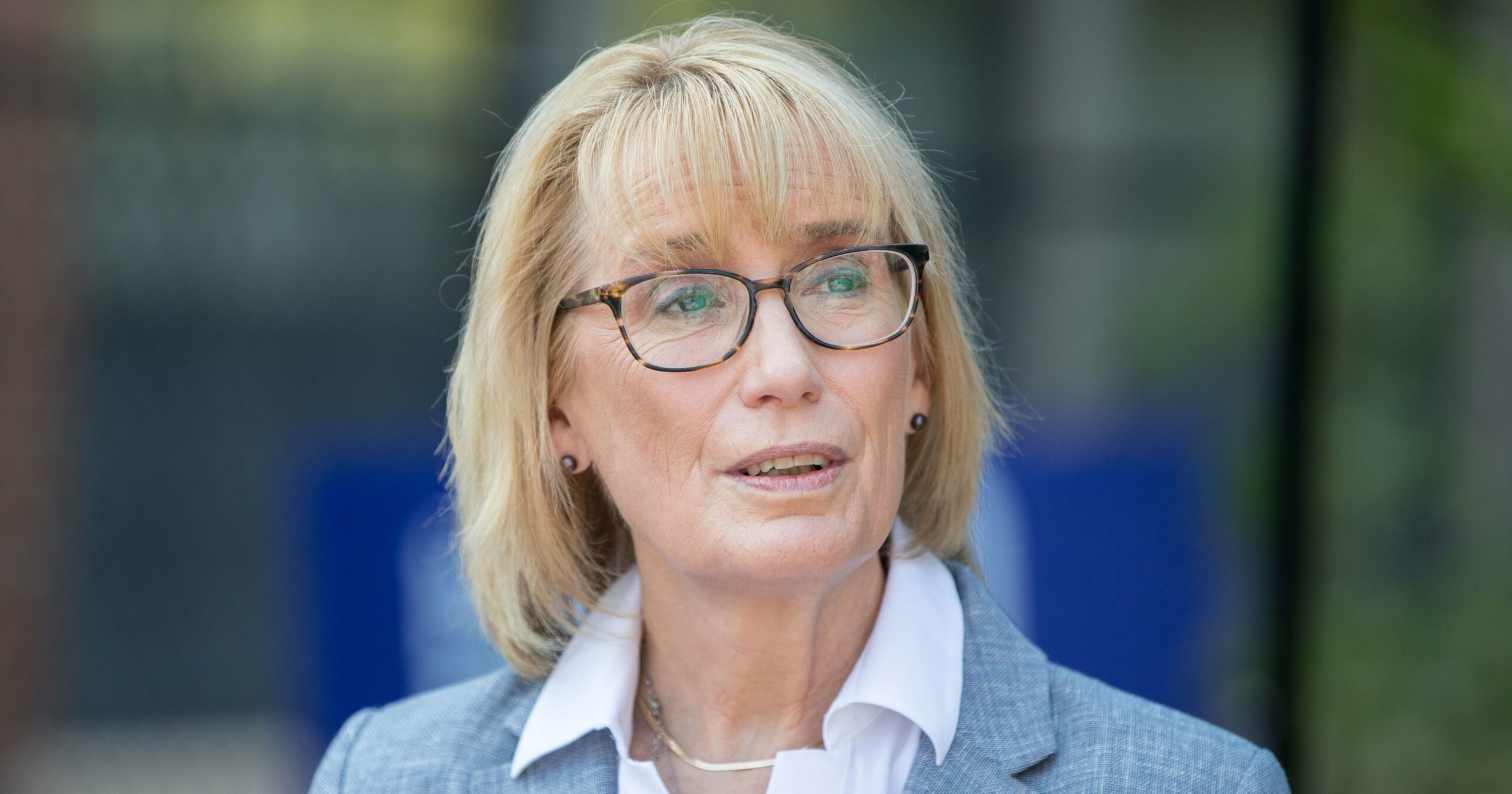New Hampshire Sen. Maggie Hassan has long been a fierce advocate for women’s rights and working families. She was initially inspired to run for office to ensure children like her son Ben, who has cerebral palsy, were fully included and had the same opportunities to thrive in their communities.
In 1991, when she was 33, she became pregnant with her second child. But at her 12-week appointment, the senator learned she miscarried and moved forward with a D&C procedure. Since the overturning of Roe v. Wade in 2022, women in states with abortion restrictions have reported hurdles or denials to the routine procedure, even in cases where the fetus is expelled.
Over 30 years later, she’s opening up about her experience publicly to underscore the reproductive freedoms at stake ahead of the presidential election. Looking back, she says the grief was hard enough; she can’t imagine what it would be like to be denied access to that basic reproductive care. Read her reflections, in her own words, below.
A couple of years after our son Ben was born, my husband Tom and I decided we wanted to have another child. It took us a while and we were pretty anxious about it, but I became pregnant in the fall and we were so looking forward to having this baby. At around nine, 10 weeks, we began to tell people because I was unbelievably morning sick. I went to a dear friend’s wedding in December and it turned out that two of my girlfriends from college were also pregnant at about the same stage I was. We were all really, really excited.
In early January, I went in for my 12-week checkup. I was still experiencing morning sickness and it felt like the pregnancy was progressing. But my doctor said, “Oh, this is kind of odd. I don’t hear a fetal heartbeat.” I have a tipped uterus, though, so she said it was probably just the position of the fetus and the position of my uterus. “I’m sure everything’s fine. Let’s just have you do an ultrasound tomorrow,” she said.
The next morning, I went to the community hospital for an ultrasound and it seemed like a typical thing. My husband wasn’t with me because I thought it was all going to be fine. But the radiologist came into the room afterwards and said, “I’m sorry, but this fetus has no heartbeat. It looks like the fetus stopped growing at about 10 weeks.” He told me to follow up with my ob-gyn and left the room. I left the hospital teary and dazed and not sure what I was supposed to do next. I drove around a little bit, found a phone booth and some change, and called my doctor’s office. They said I would have to come in the next day.
Some of it is still hazy because the whole thing was so unexpected, but as I remember it, my doctor and I went over what the D&C procedure was. She said it was her recommendation. She explained why it was the only option for me, given that my body had been holding onto this fetus for two additional weeks after the heartbeat had stopped. In my view, it was what you did if you miscarried and needed to fully expel a fetus. I remember her being very reassuring and comforting, but it is an uncomfortable procedure and it’s particularly uncomfortable when you’re stressed and upset.
After the procedure, I went home and curled up on the couch. I didn’t want to do anything or see anybody. My husband and I canceled our social plans for the weekend. We were in tears as we had to tell family members and my girlfriends what had happened, and it was just really, really troubling and hard. Of course, two of my best friends were pregnant almost at the exact same stage. It felt like here we were, the three of us, and I was the one who couldn’t continue the pregnancy.
I had friends who had had miscarriages, but I just had no idea how devastating it was. I felt like a failure because we had been trying so hard to get pregnant. I was close to my mid-thirties. We were devastated and heartbroken.
I recovered from the D&C pretty quickly and our doctor said we could try to get pregnant again. I realized that I was pregnant with our daughter about six months after the procedure. Obviously, that softened the miscarriage loss a lot. But with this new pregnancy, we were on pins and needles the whole time. Because we had thought things were fine at the 12-week point last time, and until fairly late in this pregnancy, we were still pretty nervous.
As I started talking about my miscarriage with friends recently, I was surprised by how fresh some of my feelings still are. When I went through this experience, as devastating as it was, it never occurred to me that I wouldn’t have access to state-of-the-art medical care to make sure that we were doing everything we could to protect the pregnancy in the first place, or if something went wrong, to protect me and protect my reproductive system so I could try and get pregnant again.
I’m grateful that I had the freedom I did. I am hoping very much that my 31-year-old daughter will have that freedom restored to her.
Since the Dobbs decision that overturned Roe v. Wade, women all over this country can be going through the same experience I had, but they may not be able to access a D&C procedure because it’s also used to perform an abortion when there’s a fetus that does have a heartbeat. In some states, the fact that a woman gets this procedure means she can be investigated or prosecuted, even if she is having it as I did, to remove a fetus that died in utero.
That’s not who we are in America. Women are supposed to be free and equal citizens, which means we should have the same kind of bodily autonomy and make the same kind of healthcare decisions that men do. In some states, doctors who perform this procedure can be investigated or prosecuted, which means that fewer doctors want to go into reproductive medicine. So at a time when we are seeing maternal healthcare deserts around the country and it’s harder and harder to access basic reproductive care because of the scrutiny abortion bans are creating, I think it’s important for women and men around the country to understand what is at stake in this election around reproductive healthcare.
I want people to understand that if Donald Trump and JD Vance are elected, the state of women’s health care in the United States is going to get worse and worse. These state abortion bans will continue to be in place and Trump and Vance will work to enact a nationwide abortion ban, putting all kinds of health care at risk and impacting women in every part of the country. Access to IVF and birth control is going to be impacted. What is at stake here is whether we are going to be relegated by Donald Trump, JD Vance, and like-minded Republicans to second-class citizenship.
I think a lot about how I lost that pregnancy. I needed to have a D&C to remove the fetus to protect my health and to protect my reproductive future. I’m grateful that it never occurred to me that I would risk being prosecuted for getting health care. The ramifications that I did experience were hard enough. The grief was hard enough. The impact on me, my husband, and my family was hard enough. I’m grateful that I didn’t have this now-additional layer of complications. I’m grateful that I had the freedom I did. I am hoping very much that my 31-year-old daughter will have that freedom restored to her.
I want all of us who care about women’s autonomy and all of us who want to have children and start families to do it on our own terms. This election is a watershed moment for women’s health and reproductive rights. We need to vote.
Yerin Kim is the features editor at POPSUGAR, where she helps shape the vision for special features and packages across the network. A graduate of Syracuse University’s Newhouse School, she has over five years of experience in the pop culture and women’s lifestyle spaces. She’s passionate about spreading cultural sensitivity through the lenses of lifestyle, entertainment, and style.



